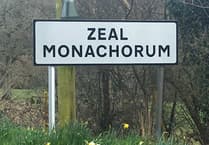AS the UK Government works out what the nation’s future relationship with the European Union will look like, some Devon farmers are concerned that Brexit will lead to challenges for an industry already feeling the strain.
While some in the agricultural industry feel that leaving the EU will create opportunities, others are concerned that breaking the ties could place yet further pressures on the industry with a potential loss of subsidises and uncertainty over new trade agreements.
And these on top of a list of challenges that farmers everywhere are facing, and which have prompted many businesses to diversify into other areas to supplement their incomes.
Devon County Council is now looking closely at the industry; its contribution to the Devon economy; the challenges it is facing; and at the support the sector relies on. It wants to see an industry that’s fit and flexible and able to grow.
And despite the challenges, continued growth in the value of the agriculture, forestry and fishing sector to the economy in Devon is expected.
Experts were predicting last year that the total gross value added (GVA) for the Devon industry - the measure of the value of goods and services produced – could rise from £271.2 million in 2015 to £375.7 million by 2025.
That is a comparatively small contribution to Devon’s total GVA, just some two to three per cent, but its effects are significantly wider than that through supply chains supporting manufacturing, and tourism.
Economists estimate employment within the Devon industry at around 12,600 jobs, with many of those self-employed.
And livestock is the county’s preferred form of agriculture, including dairy, beef and sheep, taking advantage of Devon’s comparatively high-yield grasslands.
But the industry has long faced challenges.
Low earnings, high land prices and a shortage of let farmland is discouraging young people into the profession. It has an aging workforce, and many of them are predicted to leave.
Economists, Cambridge Econometrics predict a reduction of 700 farming jobs in Devon by 2020 and a further 400 by 2025.
The costs of fertiliser and feed, although they fluctuate, are generally increasing; while for some sectors - dairy for example - prices in the shops for their products have been low.
For some dairy farms, milk prices are still below that required to offset increased costs of production and return a reasonable profit.
That’s a real problem for smaller farms, and with South West farm sizes some 70 per cent smaller than the English average, it is a problem for Devon’s farmers.
On the up side, Devon County Council provides a range of support to the industry, with its very successful 3,900 hectares farms estate designed to provide opportunities for new entrants to the sector. And the council provides various funding programmes and support schemes to help rural businesses.
The council’s Place Scrutiny Committee has a Task Group looking at the health of the agriculture industry.
The Task Group also wants to identify ways in which the county council, partners and central government can help support, sustain, and develop the industry.
It is drawing upon expert opinions from a variety of witnesses, from farmers to other landowners to food manufacturers and other professionals in the field.
Councillor Brian Greenslade, Chairman of the Agriculture Task Group, said: "As important as agriculture is to the pounds and pence of the Devon economy, it’s also an industry responsible for what makes Devon one of the most desirable counties in the UK in which to live and work.
"Without a thriving agriculture industry, we would all be the poorer for it in many ways.
"Periodically we take the temperature of the industry, a health-check. Devon County Council already supports the industry through a number of different ways, but we want to look again at the challenges that the sector is facing, at the support it might need and who’s best placed to provide that support.
"We’re inviting farmers and related businesses to let us know what their concerns for the future are, and what support they feel they need to sustain and develop the industry."
To present your views to the Task Group, please email: [email protected] .
The Task Group will compile a report that will go back to the Place Scrutiny Committee in the New Year with its findings and recommendations.
FUNDING GUARANTEE?
More recently, the government has announced that EU funding for farmers, scientists and other projects will be replaced by the Treasury in the period immediately after Brexit.
Julie Girling, the MEP for the South West and Gibraltar has since warned that farmers still faced uncertainty over their future under a different government.
The MEP, who campaigned for a Remain vote in the EU referendum, spoke out after Chancellor Philip Hammond said the Treasury would guarantee to back EU-funded projects signed before this year’s Autumn Statement.
He also gave an assurance that agricultural funding now provided by the EU will also continue until 2020.
Mrs Girling said: "There will be relief that Theresa May’s Government is taking this step so promptly. It provides continuity and stability and is the right thing to do.
"However, it gives us no assurances about the future shape of funding, particularly for the rural economy. It would be helpful to clarify that the government will replace both the EU proportion of rural development money AND the UK government match funding.
"And what about the future?...Not all governments will be as friendly to farming and the countryside as this one. What might a Corbyn-led Labour government do, for example?”
Alan Quick



